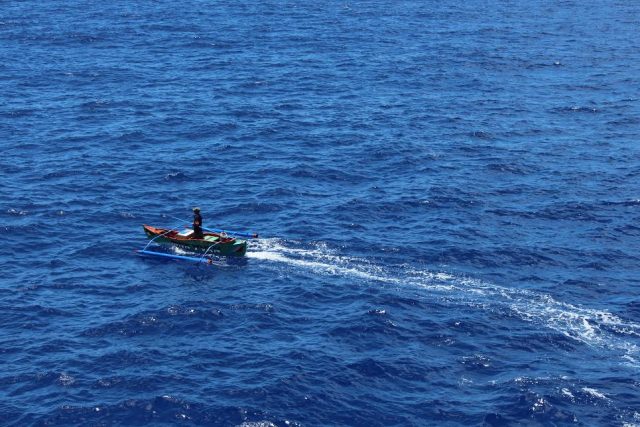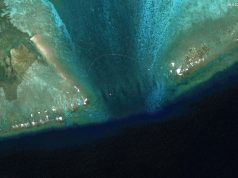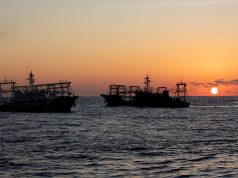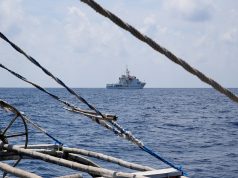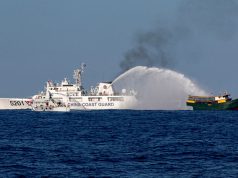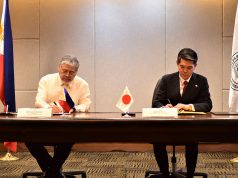MANILA – Former lawmaker and national security adviser Roilo Golez presents a good, simple reason for the Philippines to reject China’s efforts to conduct a marine scientific research in the Benham Rise: its consistent efforts to intrude into Philippine waters, and the very real possibility its mission goes beyond marine science, but partakes more of geo-strategy.
“As I said, what we need here is an ‘ABC’ rule — that is, anyone but China,” Golez, a graduate of Annapolis naval academy, said in an interview.
“The most threatening to me, and this is going to be a threat to the area where we belong – is that they’re at it from this geo-strategic point of view in order to identify possible sub channels for future sub warfare.”
For one thing, part of what the Institute of Oceanology of the Chinese Academy of Sciences (IOCAS) will study is the temperature at Benham Rise, he said.
Once the Chinese determine the area’s thermocline, or the region of the sea where temperatures can suddenly grow cold, they can then pinpoint pockets where they can park submarines that are hard to detect.
“It has strategic importance because it’s a good area for submarine channels which an oceanographic survey could reveal. The PLA submarines can hide in those channels because 13 million hectares is such a big space — constituting a threat to the security of the Philippines and our allies in the Western Pacific,” said Golez.
Golez said the Philippine government should not be too quick in believing in China’s “in good faith” stance when it enters Philipppine territory. After all, he added, it had once misled the Philippines into believing that the structures it was building on Mischief Reef in the mid-90s were simply fishermen shelters. And now, Golez pointed out, those “fishermen shelters” have grown to over 500 hectares.
Environmentalists, as well as legal and defense experts, are also expressing concern over the Duterte administration’s decision to approve the marine scientific research that China will conduct at Benham Rise, which has since been re-named Philippine Rise.
“Why China, which has wronged us? After all the things that they did on the west side, the West Philippine Sea — they’re claiming until now 90% of the WPS. They’ve practically taken hold of the Scarborough Shoal, and yet we will give them entry to Benham Rise? I can only assume that they have a hidden agenda here.”
There is nothing wrong in conducting research at Benham Rise, said Golez, but deplored the apparent tendency of the administration to incline toward China despite all that it has done to illegally enter Philippine territory.
“You tend to wonder if we have become a vassal state of China, since we’re giving it everything even though we have problems with them. We won [in the international tribunal, which declared China’s nine-dash line claim illegal]; it was in our favor even … There’s just too much preferential attention give to China when we know the history,” said Atty. Gloria Ramos.
Atty. Jay Batongbacal, head of the Institute for Maritime Affairs and Law of the Sea, noted that China had repeatedly used the conduct of marine scientific research to enter Philippine waters.
He recalled how, in 2017, Defense Secretary Delfin Lorenzana himself expressed fear over Chinese research activity in Philippine waters which did not include a Filipino scientist as required by the UN Convention on the Law of the Sea (UNCLOS).
This could have been the opportunity to make China accountable for its violations, said Batongbacal.
“Approval can be withheld if the researching state has pending obligations to the coastal state arising from previous marine scientific research, and this is the one that does not seem to have caught the attention of the government considering the many previous MSRs conducted by China in other parts of Philippine waters,” he added.
According to Batongbacal, “This could’ve been an opportunity for the government to call China to account for its previous activities but as you’ve seen, instead of addressing concerns directly, such as where is research going, what kind of information it’s going to extract…The government has not been responsive to that.”
Batongbacal also took issue with the government’s apparent belittling of the capacity of Filipino scientists to do research at Benham Rise, while signalling that only China has the capacity for such.
“The first instinct of the government is always to justify or defend China being the one that can do this research,” he said.
“Let me be clear that China is a formidable force in marine sciences. But that doesn’t mean that we should always be calling or accepting or cooperating with china on the basis of inequality, harping on poverty and lack of resources,” he added.

